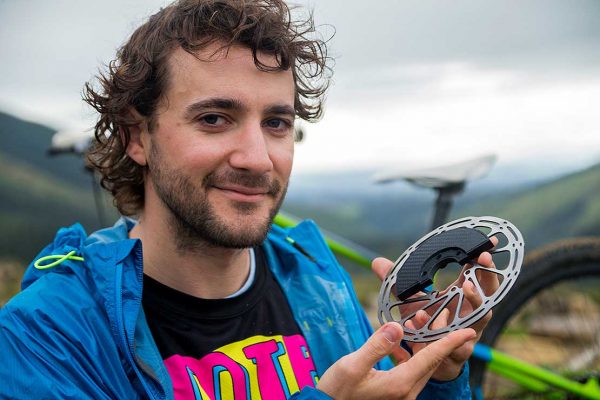You've heard of drivetrain power meters, here's the Brake Power Meter
A new invention from New Zealand measures your braking power and your time spent spent braking during a ride.
Watch: Secrets of better riding – braking and pedalling
Patented prototype
The idea is a product of Matt Miller and Dr Phil Fink from Massey University in New Zealand. The patent protected invention is currently just at the prototype stage but already the creators are claiming strong interest from bike racing teams.
Miller and Fink are about to hit the international bike trade shows with a second prototype that should bear strong resemblance to a finished commercial product.
The Brake Power Meter shows you how hard you’re braking. It also shows you how long you have the brakes engaged (either dragging or full-on).
It’s possible to inspect the data at the end of a timed lap or downhill run and highlight your braking patterns.
>>> The best mountain bike disc brakes
But why?
Ultimately it’s to do with trying to shave time off race runs (either XC or DH racers are the product’s intended market).
By analysing how a racer has used their brakes the idea is that they can then work on braking less generally and when they do brake, to brake more efficiently.
As well as saving time, better braking should lead to less rider fatigue which – over a XC race especially – will again help to shave some seconds ultimately.
>>> Nine talking points from the Val di Sole DH World Champs
Braking indicates the level of a rider’s skill
Matt Miller: “We took several national-level mountain bikers and had them repeat a descent without pedalling. Not only was there huge variation in the time it took them to complete this descent, but there were also differences in their braking as they practiced the track more.
“What wins races? Speed. Speed is a result of how hard you pedal [propulsive power] and how little you slow down. Changing your speed depends on how fit, or unfit you are, and of course how much you brake. We think braking indicates the level of a rider’s skill.
“So far, cyclists have only been able to measure propulsive power using power meters, and analyse this data to focus training on improving their fitness. But we have uncovered distinct braking pattern differences between trained mountain bikers and untrained, which indicates that focusing on skill training could make riders faster as well.
“More skilled, faster riders brake powerfully over a short space of time, whereas slower, less skilled riders brake with less power over a longer time period.”
There’s no word of a estimated price or indeed a release date. That will all depend on Miller and Fink finding a bike industry backer(s).
It’s certainly an interesting concept though.




